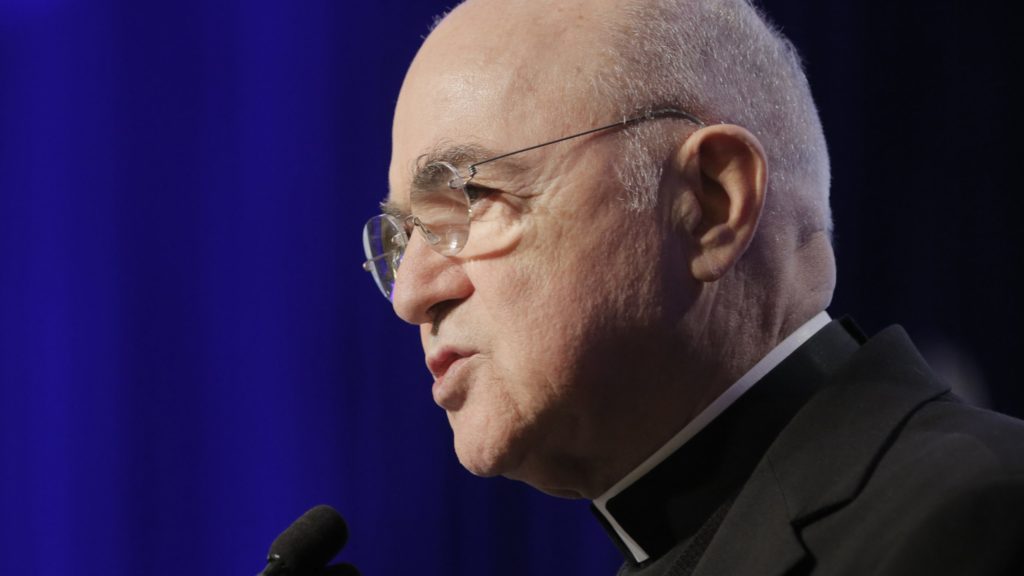In a stroke of irony, the Vatican’s doctrinal office on Thursday, which marked the United States’ Independence Day, convened and formally declared that a former US envoy charged with schism was excommunicated.
In a July 5 statement, the Vatican’s Dicastery for the Doctrine of the Faith (DDF) announced that nearly six years after calling on Pope Francis to resign, Italian Archbishop Carlo Maria Viganò, who served as nuncio to the United States from 2011-2016 and who has accused Pope Francis of abuse coverup, was excommunicated.
Previously, Viganò had been summoned by a DDF decree to appear at the Vatican for a June 20 audience to answer to charges of schism based on “public statements which show the denial of the elements necessary to maintain communion with the Catholic Church: denial of the legitimacy of Pope Francis, breaking communion with him, and rejection of the Second Vatican Council.”
Viganò, who did not show up for his summons, published the decree on social media, saying the charges against him were an “honor.”
In their statement Friday, the DDF said that during a meeting convened the day before, the extrajudicial process against Viganò, meaning it was an administrative procedure rather than a canonical trial, for schism had concluded.
“His public statements manifesting his refusal to recognize and submit to the Supreme Pontiff, his rejection of communion with the members of the Church subject to him, and of the legitimacy and magisterial authority of the Second Vatican Council are well known,” the statement said.
At the close of the penal process, Viganò, it said, “was found guilty of the reserved delict of schism,” and the DDF thus declared a latae sententiae excommunication against him, meaning he incurred the excommunication himself through his own schismatic acts.
The DDF stated that the lifting of the excommunication is reserved to the Vatican, and that Viganò was informed of the declaration on July 5.
A longtime official at the Vatican, Viganò first shot to global notoriety during the August 2018 World Meeting of Families in Dublin.
On the last day of the pope’s visit, carefully choreographed to navigate enduring suspicion of the Catholic Church related to the country’s clerical abuse scandals, Viganò published an 11-page “testimony” in which he accused Pope Francis of covering up for former cardinal and priest, Theodore McCarrick, who was charged with sexually abusing minors and the sexual harassment of adult seminarians.
Viganò in the letter called on Pope Francis to resign, claiming Francis knew about allegations against McCarrick yet eased restrictions on his ministry and travel, and he also alleged a broad homosexual culture inside of the Vatican.
Since then, he has consistently published open letters questioning Pope Francis for alleged doctrinal heresies and abuses of authority. He has also rejected many of the reforms of the Second Vatican Council, and was critical of the pope’s decision to restrict the Traditional Latin Mass.
Prior to his appointment to the United States, Viganò caused waves in Rome when, while serving as the secretary, or number two official, in the Government of the Vatican City State, he attempted to expose alleged overspending and mismanagement, and earned a reputation as a whistleblower.
On the other hand, he was also seen by many Vatican insiders as a prickly personality who could be difficult to work with.
Shortly after his summons for his June 20 audience, the breakaway traditionalist Society of St. Pius X (SSPX), distanced itself from Viganò, despite rumors that he had been reconsecrated as a member of the group, on grounds that public statements made by Viganò after his summons went beyond the acts that got their own founder excommunicated.
Referring to one statement in which Viganò said Pope Francis had a “defect of consent” when accepting his election to the papacy, the SSPX in a June 24 statement that the reference to a “defect of consent” meant that “according to Viganò, Cardinal Bergoglio considered the papacy as something other than what it really is. He accepted the pontifical office without fully consenting, and this error resulted in the nullity of his acceptance. His pontificate would therefore be that of a placeholder.”
“Archbishop Lefebvre and the Society he founded have not ventured down that perilous road,” they said, referring to their founder Archbishop Marcel Lefebvre, who was himself was declared to have incurred excommunicated for schism in 1988.

